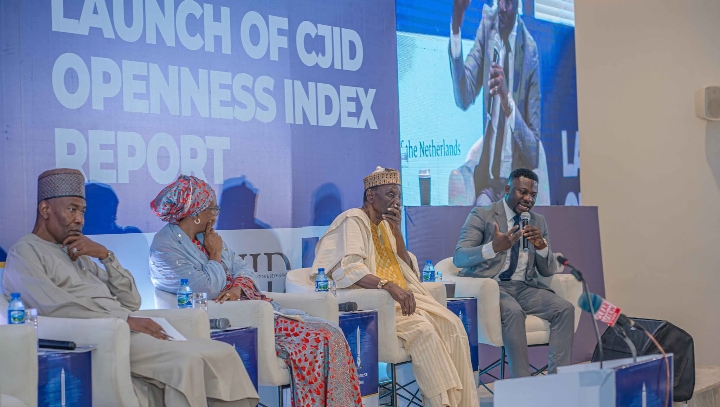The Centre for Journalism Innovation and Development (CJID) has launched its groundbreaking Openness Index report, a tool designed to assess the degree of transparency, civic participation, and institutional accountability across Nigeria.
TheNewsGuru.com (TNG) reports the CJID Openness Index report was launched during a high-level event held in Abuja, bringing together policymakers, journalists, civil society actors, and development partners.
In his welcome address, CJID’s Chief Executive Officer, Mr. Dapo Olorunyomi, described the Openness Index as “more than a set of metrics.” Rather, he said, it is “a mirror held up to our institutions, our governance, our civil space, and to ourselves”.
Olorunyomi emphasised that the Index is a call to action in a time of rising repression, shrinking civic spaces, and digital authoritarianism. “Openness is not a luxury; it is a necessity,” he stated, adding “Democracy without transparency is a hollow shell.”
The Index, developed in partnership with the Wole Soyinka Centre for Investigative Journalism and funded by the Government of the Netherlands through its Embassy in Abuja, provides a data-driven framework to evaluate how open Nigeria’s subnational and national institutions are.
It measures factors such as access to information, citizen engagement, media freedom, and government responsiveness.
“This tool allows us to benchmark progress, diagnose weaknesses, and celebrate strengths,” said Olorunyomi. “But no index alone can safeguard democracy. Only people can — citizens who take the findings and turn them into advocacy, reform, vigilance, and action”.
During the launch, in a significant announcement, Olorunyomi also introduced CJID’s new Local Media Sustainability Fund, an initiative aimed at strengthening grassroots journalism and enhancing media coverage of local governance and civic issues.
“Our research has shown that the most consequential stories are unfolding at the local level — in state capitals, remote towns, and underserved communities,” he said. “Yet, this is where media capacity is weakest and sustainability most fragile.”
The Fund will serve as a catalytic intervention to support local newsrooms, content creators, and accountability journalists with financial aid, capacity building, and innovative revenue models. According to the CJID boss, the goal is to ensure that local voices are not only heard but also protected.
“We believe this initiative could mark the beginning of a new era — one where journalism flourishes beyond urban centres, and where democracy deepens because information flows more equitably,” he added.
TNG reports that the event convened a wide cross-section of Nigeria’s democratic ecosystem, ranging from public officials and development experts to researchers, journalists, and citizens.
Olorunyomi highlighted the importance of this diverse participation, noting that while roles may differ, the shared mission of promoting fundamental freedoms unites all attendees.
“As the custodians of liberty and freedom, we must become a band of conscious protectors — guardians of the norms and institutions that keep democracy vibrant and development sustainable,” he charged the audience.
He concluded his address by extending gratitude to the CJID board, research team led by Professor Ismail Ibraheem, and the centre’s staff, describing them as “unarguably the best in this game.”
The launch of the Openness Index and the announcement of the Local Media Sustainability Fund mark a major step in CJID’s ongoing effort to foster transparency, support independent media, and defend democratic values in Nigeria and across West Africa.
Dutch Envoy commends CJID’s efforts to promote press freedom
Meanwhile, the Dutch Ambassador to Nigeria, HE Bengt Loosdrecht, in a goodwill message at the launch of the CJID Openness Index report, commended CJID for its efforts to promote press freedom and uphold quality standards for journalists.
The Ambassador noted that CJID’s work is crucial in a time when democratic freedoms are under threat and journalists face increasing restrictions, legal threats, and digital surveillance.
He cited examples of journalists being imprisoned and intimidated worldwide, including in his home country, the Netherlands, where politicians have been known to vilify journalists.*
Loosdrecht emphasised the importance of a free and independent press in any democracy, noting that reliable journalism is facing real threats.
He highlighted the decline in press freedom globally, citing the example of Nigeria’s recent slide in the World Press Freedom Index.
However, he expressed optimism that initiatives like the CJID Openness Index Report can guide smarter policy and meaningful reforms.*
The Ambassador praised CJID’s efforts to promote quality journalism and support journalists in Nigeria, while noting that the country’s diversity and complexity require a nuanced understanding, and the Openness Index report provides a valuable tool for policymakers and stakeholders.
The launch of the CJID Openness Index Report is a significant milestone in promoting transparency and accountability in Nigeria.
With the support of partners like the Dutch Embassy, CJID’s initiative has the potential to make a lasting impact on the country’s democratic landscape.
The report’s findings and recommendations are expected to inform policy and advocacy efforts, promoting a more open and democratic society.


